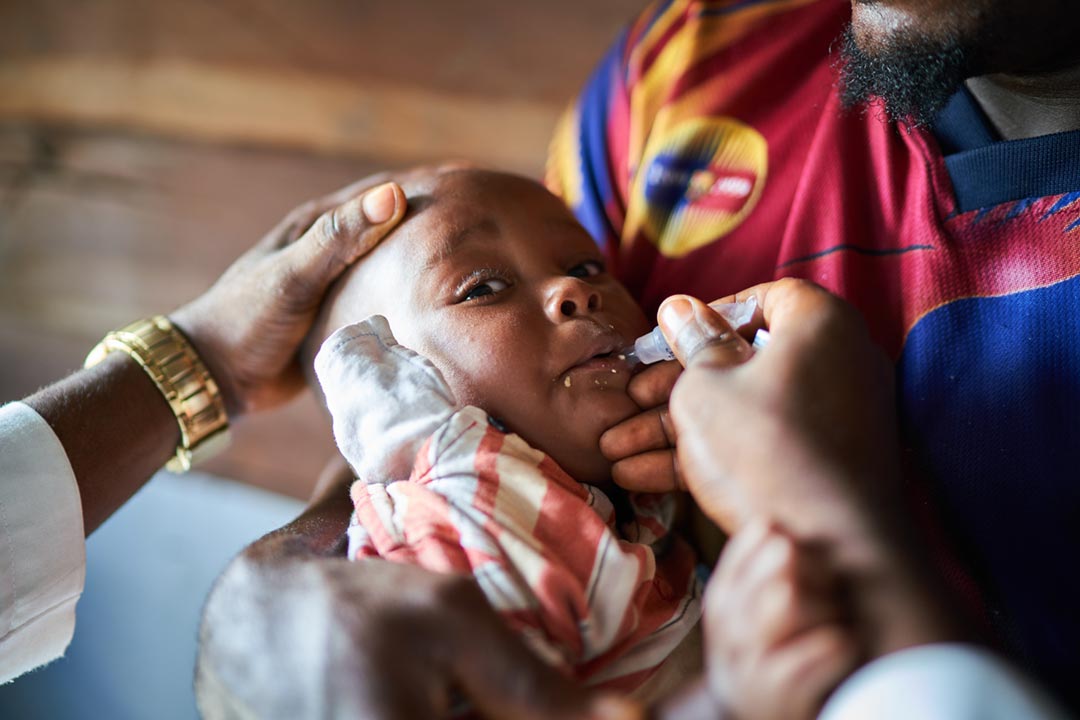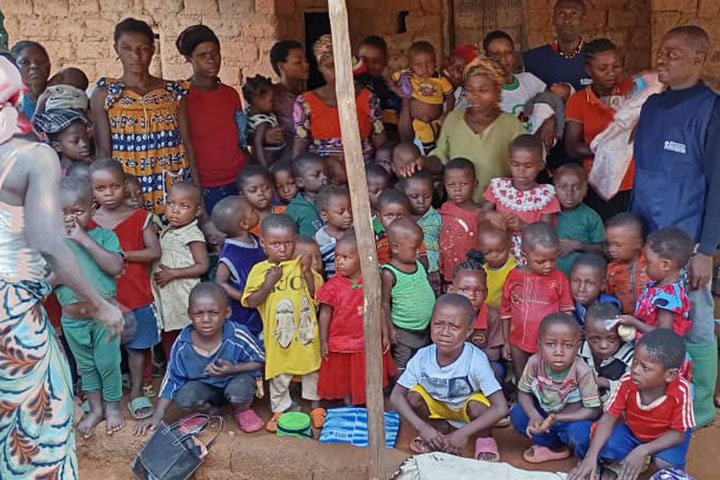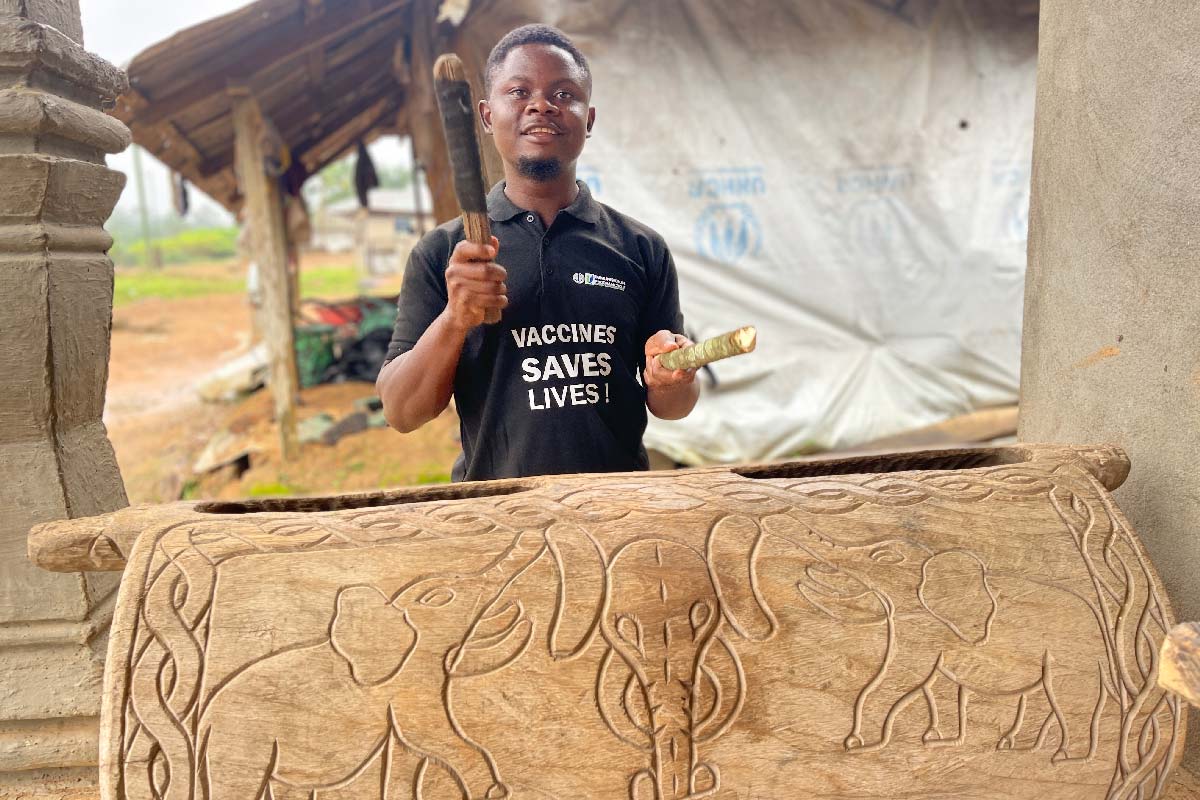Tracking zero-dose children in the slums of Cameroon
Rumours and limited outreach activities have increased vaccine hesitancy in Domayo, Cameroon. Community leaders are fighting back, preaching the good news of vaccination.
- 21 November 2023
- 4 min read
- by Delphine Fri Chifor

Domayo-Banana II is a two-faceted community in Maroua, in the Far North Region of Cameroon. Behind the beautiful, well-designed, new layout homes is another community with crowded, dilapidated houses that tell the story of an impoverished community struggling to put food on the table to survive.
Though barely three kilometres from the closest health facility, the inhabitants of Domayo-Banana II have experienced their fair share of epidemic outbreaks. In 2015, a measles outbreak claimed the lives of three children, while in 2019 a yellow fever case was suspected and identified in that same community.
"When our chief visited my husband and me to assure us that it was to protect our children, I immediately changed my mind. We trust him, and we know he has our interests at heart.”
– Hasana Mouda, mother of two
"If we do not come to vaccinate their children, they seldom come to us," says Yagui Albert, Chief of the Catholique Health Center in Domayo. "Sometimes, when we organise outreach activities in this community, some still prioritise other activities. Every so often, we could not access some homes because the men had to be informed to grant their permission. It was difficult to know exactly why they were not coming, despite all the efforts to make them understand the benefits of immunisation."
Creating behaviour change
Barsina Madi, a third-class chief of Domayo-Banana II, is a respected member of the community. Women and men alike respect and listen to him and freely express their worries. His quest to see his people stay healthy led him to serve as a community health worker for his community.
"I derive pleasure when I see children in my community healthy and parents happy. Ensuring their well-being is a passion and my obligation as their leader," says Madi.
Madi dedicates his Wednesday mornings to carrying out door-to-door education on the importance of maternal health care, vaccination and clean water, sanitation and hygiene amid other health-related needs of his communities.
"Due to the high rates of home deliveries in my community, my initial focus was to discourage such practices and make families understand the risk involved. With time, I empowered myself to give them basic education on several topics to meet their needs whenever I was solicited. I also meet with my fellow men to make them understand their role in ensuring a healthy family."
Messaging pays off
Having Madi teach them the importance of different health-related themes made more people open up and explain their scepticism, while receiving factual feedback on the subject matter from a local community leader they trust.
Hasana Mouda is one of the people who did not trust vaccines and had preferred to keep her children home until her encounter with her leader. Madi helped to change her mind and follow up for the administration of the first dose of the pentavalent vaccine to her 53- and 26- month-old children on the same day.
Have you read?
"I was scared. I [heard] that vaccination could render my children sterile. I needed help from a trusted person to understand its usage. When our chief visited my husband and me to assure us that it was to protect our children, I immediately changed my mind. We trust him, and we know he has our interests at heart," Mouda attested.
Domayo-Banana II still has a long way to go to create better health-seeking behaviours among community members. However, Madi is optimistic that his community members are better off today than some years ago. He affirms that with the support of the Zero-Dose Immunization Programme (ZIP) Initiative, funded by Gavi and implemented by RAISE 4 Sahel in three regions in Cameroon, his community is getting better.
ZIP helped his zero-dose community to uncover the root causes of the poor health-seeking behaviour of his people and put in place systems to mitigate the barriers.
"I am confident that my people's health-seeking behaviour will improve in the coming months. By involving community and opinion leaders in the problem identification, solution designing and implementation processes is mind-blowing. Experiencing this transformative approach of project implementation is making a big difference in my community," Madi added.
Using human-centred design approaches is a strategy used by the ZIP initiative to identify and vaccinate zero-dose children among minority groups and hard-to-reach communities of Cameroon.









